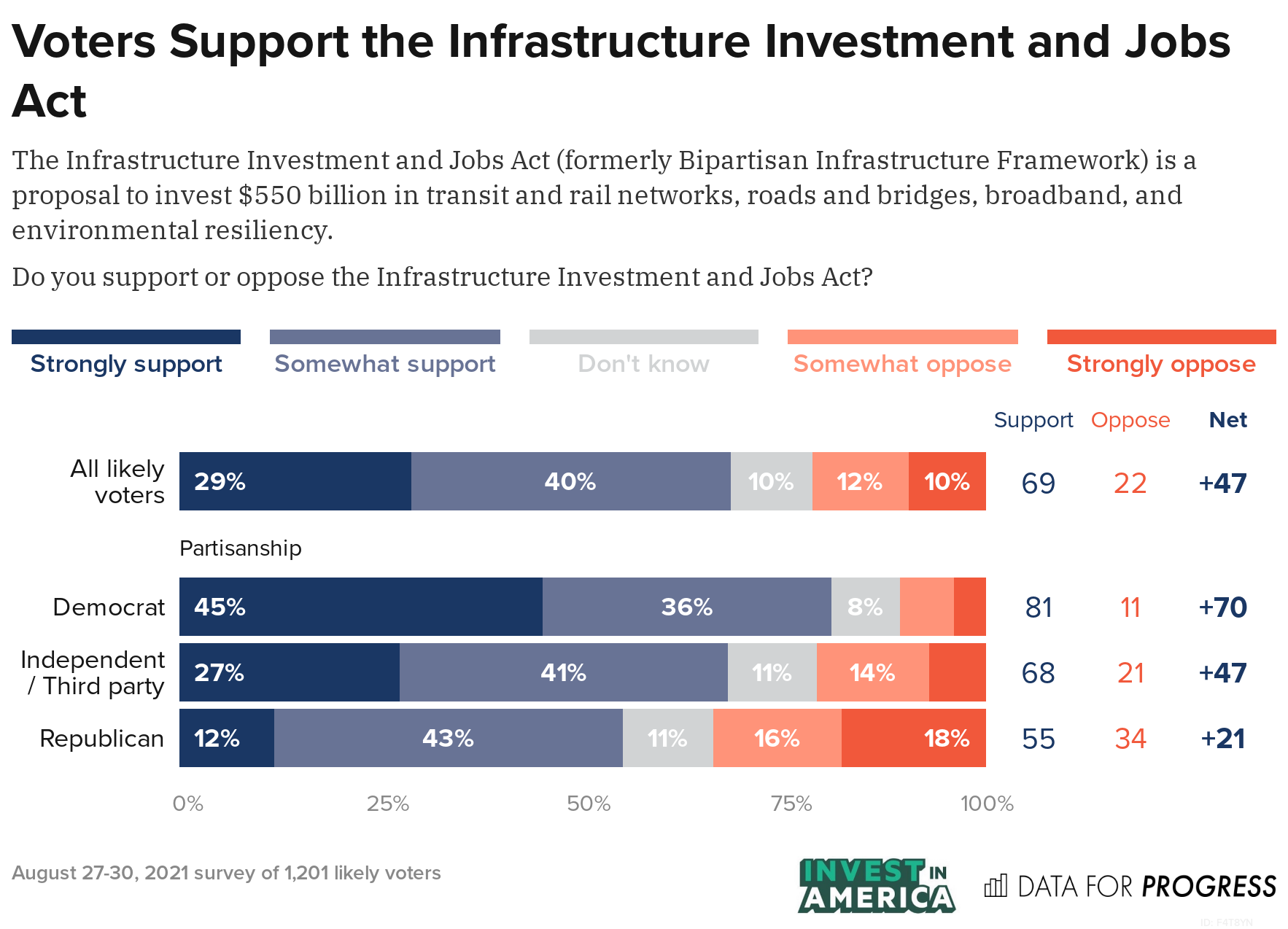Voters Support All Provisions of the $3.5 Trillion Build Back Better Bill
By Anika Dandekar and Ethan Winter
As part of an August survey of likely voters nationally, Invest in America and Data for Progress tested support for both the Infrastructure Investment and Jobs Act (formerly the Bipartisan Infrastructure Framework) and the Build Back Better bill, Congressional Democrats’ $3.5 trillion proposed budget.
This new polling again confirms that likely voters support the Infrastructure Investment and Jobs Act and all provisions of the $3.5 trillion budget bill. We have now also found that likely voters don’t want any provisions cut from the bill. In addition, we find voter support for the bill’s size and pay-fors.
A Bipartisan Majority of Voters Support the Infrastructure Investment and Jobs Act
Likely voters support the Infrastructure Investment and Jobs Act by a +47-point margin (69 percent support, 22 percent oppose). Support for this bill extends across self-identifying partisan lines, with Democrats, Independents, and Republicans backing the bill by margins of +70, +47, and +21 points, respectively.
A Majority of Voters Support Passing $3.5 Trillion of Investments Through Reconciliation
We also tested support for the $3.5 trillion reconciliation plan that Democrats in the Senate are currently considering. We find that likely voters support this proposal by a +31-point margin. Democrats and Independents support this proposal by +74-point and +26-point margins. Forty percent of Republicans support this proposal and 52 percent oppose it.
Voters Support the Provisions of the $3.5 Trillion Reconciliation Package
We also tested support for some of the specific policies that may be included in the final reconciliation package. The most popular provision is investments in long-term care for seniors and people with disabilities, backed by a margin of +68 points. Modernizing school buildings and the electricity grid are both supported by margins of more than +50 points. By more than +30-point margins, likely voters support funding universal pre-K and a pathway to citizenship for undocumented individuals. By more than a +25-point margin, likely voters support lowering the Medicare eligibility age, creating a Civilian Climate Corps, and tuition-free community college. Lastly, by a +15-point margin, likely voters support extending child tax benefits.
Voters Do Not Want to Cut Any of the Provisions of the Build Back Better Bill to Make It Cheaper
Some moderate Democrats have expressed concern about the topline cost of the $3.5 trillion budget proposal. The concerns tend to not mention specific provisions. To that end, we tested to see if likely voters would actually want to cut any of the provisions of the Build Back Better Bill with the context that some lawmakers say it is too expensive.
Of the nine proposals tested, a majority of likely voters want eight to remain in the budget — for the ninth proposal, a plurality wants it to remain in the bill. Majorities of likely voters said they wanted long-term care (75 percent), modernizing the electricity grid (69 percent), modernizing K-12 schools (64 percent), a pathway to citizenship for undocumented people (53 percent), tuition-free community college (53 percent), and lowering the Medicare eligibility age (51 percent) to remain in the package. By +15-point margins, likely voters said they would prefer the creation of a Civilian Climate Corps and universal pre-K to remain in the bill. Finally, by a +8-point margin, likely voters prefer the extended child tax cuts to remain in the bill.
Voters Support Increased Government Investment
When asked if voters prefer increased government investment in our economy or stopping government investment, a majority of likely voters (54 percent) said they wanted more investment. Increased government spending enjoyed support from over three-quarters of Democratic voters and half of independent voters. Thirty-two percent of Republicans preferred increased government spending, while 61 percent of them preferred stopping investment.
Voters Say the Wealthiest Must Pay Their Fair Share to Fund Community Investments
When asked whether they prefer increasing taxes on wealthy individuals and corporations or not changing tax rates, a majority of voters (60 percent) said they wanted more taxes for the wealthy. Increased corporate and wealth taxes enjoyed support from 72 percent of Democratic voters, 64 percent of Independent voters, and 42 percent of Republican voters.
Toplines for this polling can be found here.
Anika Dandekar is polling analyst at Data for Progress.
Ethan Winter (@EthanBWinter) is a senior analyst at Data for Progress. You can email him at ethan@dataforprogress.org.






